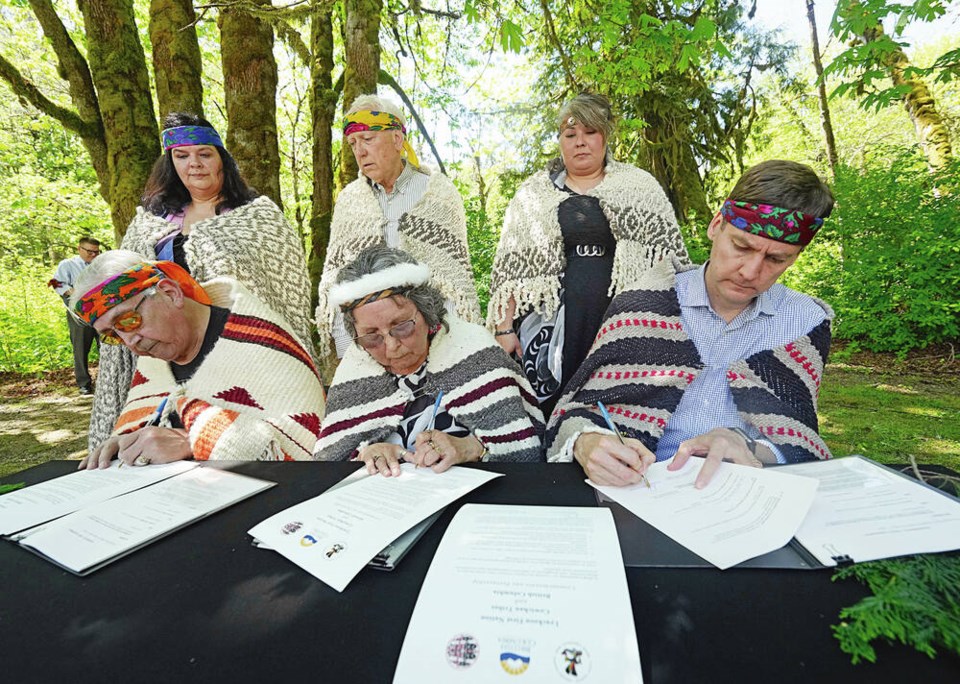B.C. is returning a 312-hectare parcel of land near Skutz Falls to two First Nations in the Cowichan Valley as part of an interim pre-treaty agreement.
The agreement between B.C., Lyackson First Nation and the Cowichan Tribes was signed in the Skutz Falls parking lot on Saturday with about 150 people attending.
“Today, we are realizing some real justice together,” said Premier David Eby. “Everyone in every community needs and deserves a place to call home.”
Indigenous dignitaries and local and provincial elected officials from across Vancouver Island and B.C. were present for the signing agreement, an event that involved songs, dances, and gift-giving of blankets, paddles, art, and cedar boxes with carved feathers inside to leaders of the three signing parties.
Lyackson Nation and Cowichan Tribes are holding the land in partnership until there is a plan to divide it between the two, the province said in a statement.
The land transfer is part of an incremental treaty agreement with B.C., the details of which will be released on Monday.
B.C. purchased the land from Mosaic Forest Management for $8.55 million.
The land transfer holds particular significance for Lyackson, who have advocated for reserve lands on Vancouver Island for four generations.
Prior to colonization, Lyackson had a winter village at the mouth of the Cowichan River. Currently, the nation’s three reserves — a total of about 790 hectares — are on Valdes Island, a Gulf Island that has little to no infrastructure.
Valdes was once home to the village of T’eet’qe’, the second largest Hul’q’umi’num’-speaking community in the Gulf Islands.
Today, there are no permanent residents on Lyackson reserve lands after most of the community moved away in the 1940s. Lyackson has 232 registered members.
There was an attempt to re-establish a community in the 1980s, but that was eventually abandoned due to the lack of electricity, running water, and reliable transportation on Valdes.
The nation’s yearly summer visits to Valdes are made via water taxi as there is no ferry service.
It was an emotional day for Lyackson Chief Pahalicktun, who said that the agreement was only made possible from “standing on the shoulders of the giants” — the many Lyackson leaders before him.
“We raise our hands to each and every one of you,” said Pahalicktun, whose English name is Richard Thomas. “Your strength and your resilience has kept our community alive, has kept us motivated.”
Lyackson will use the land to establish housing, a health centre, a band office, a cemetery and a community gathering place, he said.
Pahalicktun thanked Cowichan Tribes leadership for their collaboration on the land transfer. “We are deeply honoured that you have stood by Lyackson in a way that no other communities have done.”
Cowichan Tribes Chief Cindy Daniels said she looks forward to working with Lyackson to divide the land parcel in accordance to Quw’utsun Snuw’uy’ult, or teachings.
The Hul’q’umi’num’-speaking peoples have lived in this area for millennia, she said. “Our people would build innovative fishing weirs along the entire river.”
“With this interim treaty agreement, we are coming home and can start to realize new opportunities for our citizens,” said Daniels, who is also known as Sulsulxumaat.
The transfer will help alleviate the housing shortage facing the Cowichan Tribes, she said, adding that more than 2,200 members are on a housing waitlist.
Pahalicktun, who holds the Lyackson Nation’s hereditary chief title, announced on Saturday his intention to retire from the position after more than 30 years of service.
Lyackson treaty negotiator Shana Thomas is expected to step into the role following Pahalicktun’s retirement.
Thomas, who has worked with Pahalicktun since 2001, said she hopes to see construction within the next two years.
Of particular importance is the establishment of a cemetery so that Lyackson members will no longer have to be buried across Vancouver Island on the lands of other nations, she said.
Cowichan Tribes and Lyackson are both part of the Hul’q’umi’num Treaty Group, which has been negotiating a treaty with B.C. and Canada since 1996.
Brian Thom, a University of Victoria anthropology professor that specializes in Aboriginal title rights, said a treaty agreement is unlikely until ongoing legal battles over a former fishing site on the Fraser River is resolved, he said.
Unlike the rest of B.C., treaty negotiations on Vancouver Island are further stymied by the fact that most of the land is privately owned, a result of the E&N railway land grant in 1884 that brought the colony of British Columbia into the confederacy of Canada, Thom said.
“Governments don’t come with a mandate to negotiate private land unless there’s a willing buyer-seller arrangement, which are few and far between,” he said in an interview.
But Thom, who was involved in Hul’q’umi’num Treaty Group negotiations from 2000 to 2010, said incremental treaty agreements are a good way to show progress to both participating First Nations and the public. “We all want to come to an agreement.”
An incremental treaty agreement can sidestep the negotiations so that First Nations can gain benefits sooner, he said. “We’re acknowledging that those issues are still happening at the negotiating table. … We’re just going to solve this one little problem so there’s an immediate benefit.”
>>> To comment on this article, write a letter to the editor: [email protected]



